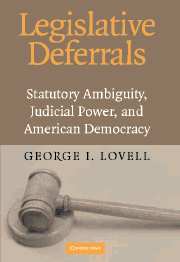Book contents
- Frontmatter
- Contents
- Acknowledgments
- Preface
- 1 Rethinking Judicial Policy Making in a Separation of Powers System
- 2 False Victories: Labor, Congress, and the Courts, 1898–1935
- 3 “As Harmless as an Infant”: The Erdman Act in Congress and the Courts
- 4 Killing with Kindness: Legislative Ambiguity, Judicial Policy Making, and the Clayton Act
- 5 The Norris-LaGuardia Act, for Once: Learning What to Learn from the Past
- 6 Legislative Deferrals and Judicial Policy Making in the Administrative State: A Brief Look at the Wagner Act
- 7 Conclusion
- Reference List
- References
- Index
3 - “As Harmless as an Infant”: The Erdman Act in Congress and the Courts
Published online by Cambridge University Press: 14 July 2009
- Frontmatter
- Contents
- Acknowledgments
- Preface
- 1 Rethinking Judicial Policy Making in a Separation of Powers System
- 2 False Victories: Labor, Congress, and the Courts, 1898–1935
- 3 “As Harmless as an Infant”: The Erdman Act in Congress and the Courts
- 4 Killing with Kindness: Legislative Ambiguity, Judicial Policy Making, and the Clayton Act
- 5 The Norris-LaGuardia Act, for Once: Learning What to Learn from the Past
- 6 Legislative Deferrals and Judicial Policy Making in the Administrative State: A Brief Look at the Wagner Act
- 7 Conclusion
- Reference List
- References
- Index
Summary
This bill may benefit organized labor, or it may be like many other laws now on the statute books – a dead letter. It will depend to a great extent on the courts. We can not tell now just how the courts will construe some of the provisions of this bill, and until that is done no one can tell whether this bill will be in the interest of the workers or not.
Rep. William Sulzer (D-NY), on the Erdman Act (31 Congressional Record 4647)I do not think it really amounts to anything, either for or against labor. … The bill, in other words, is … a species of buncombe. It is a step taken, ostensibly, in the interest of labor, which can neither be benefited nor injured by it. It is easy to get such legislation through, but hard to get any that will really benefit our laboring people.
Rep. William L. Greene (Populist-PA), on the Erdman Act (31 Congressional Record 5052)[T]oo many measures come into this House masked with favor or benefit to the poor, but carrying beneath the surface the iron hand of oppression exerted in behalf of power.
Rep. James H. Lewis (D-WA), on the Erdman Act (31 Congressional Record 5051)In 1908, the Supreme Court struck down Section 10 of the Erdman Act of 1898 in the notorious case of Adair v United States (208 U.S. 161).
- Type
- Chapter
- Information
- Legislative DeferralsStatutory Ambiguity, Judicial Power, and American Democracy, pp. 68 - 98Publisher: Cambridge University PressPrint publication year: 2003



